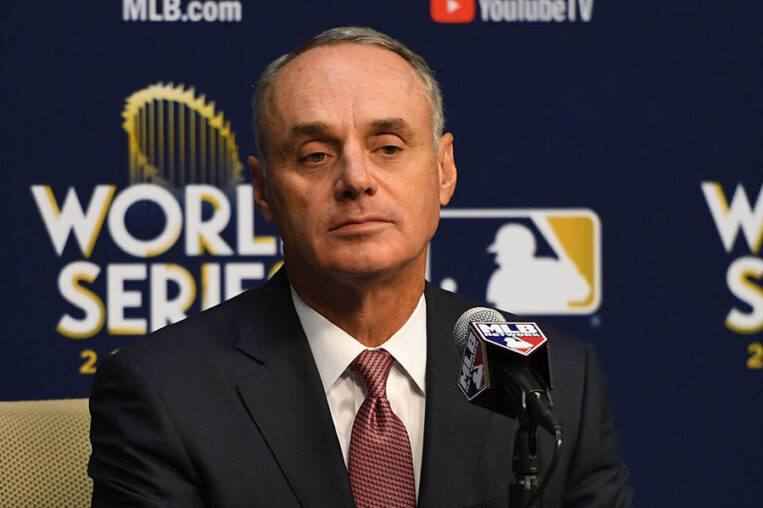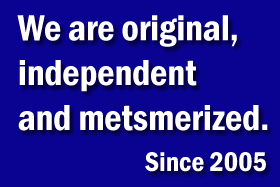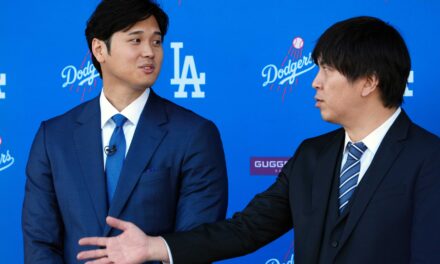
If you listen closely, you can hear the silence. Major League Baseball’s owners and its players have spoken just once (over Zoom) in the 53 days that have passed since the owners imposed the current lockout. Maybe more importantly, the silence is permeating the fans, as the baseball chatter normally ramping up at this point in the offseason has been reduced to a low simmer, essentially inaudible over the din of other sports that are in full swing.
The most important day of the offseason may be Monday. The owners and players are meeting face-to-face in Manhattan in a session whose key agenda item is the presentation of a new Collective Bargaining Agreement (CBA) proposal by the union. The last proposal by the owners was termed “disappointing” by the players, who have taken 11 days to respond.
In all likelihood, the players will present ideas that move the process forward in an increment best measured in inches, similar to what the owners did on January 13. The problem is that progress toward a new CBA needs to be measured in miles at this point, or spring training will be delayed, which is a best-case scenario. The ugly reality on the horizon is that if the dispute drags on another month, there will probably be lost games in the 2022 season. That’s an outcome neither side wants, but both sides seem willing to use it as a leverage point.
The players received just 37% of their 2020 salaries due to the pandemic-shortened 60-game season. Last year, the players received full compensation, but the owners (who claim to have lost $3 billion in 2020 with empty stadiums) began the season with limited attendance capacities in most cities for the first month or two of the season (depending on location). Both sides have lost money recently, and will do so again next season if they cannot agree on a new CBA within the next few weeks. The owners will begin to lose money sooner, if spring training is shortened, as those games generate revenue for them. The players are not paid for spring training games.
So why can’t they agree? An ongoing dispute harms both sides financially. Well, we know why they can’t iron this out smoothly. It’s not only about the issues being debated (see here for a brief summary), it’s about the basic distrust and acrimony that has been in place since the 1970s. Each side wants to come out on top, and is willing to engage in a protracted battle to do so.
In an article for The Athletic, Ken Rosenthal writes the following:
The sport has been building toward this moment seemingly since the moment the parties agreed to the last CBA in Nov. 2016. Almost immediately, player agents bemoaned that deal as a win for the owners. And the owners, not content to gain an advantage that had eluded them in more than four decades of collective bargaining, spent the next five years turning that win into an ugly rout.
The last CBA became an “ugly rout” for the owners because as the game’s revenues have gone up, players’ salaries have not followed suit. From Rosenthal’s article:
The stakes are that high for Clark and Meyer, particularly when payrolls dropped 4 percent in 2021 compared to the league’s last full season, with the $4.05 billion total the lowest over a full year since 2015. The effects from the pandemic surely contributed to that reduction, but the salary trends are unmistakable, and they are in the owners’ favor.
The players perceive their faces as being covered in egg. So, they want to win this time, and win big. The owners were the losers in CBA negotiations for decades before the last deal was signed in 2016, and they don’t want to give anything back now. So it’s not about what needs to happen Monday for the best interests of the game, it’s about beating the other side in the eye of the public. This is why things are moving slowly, and may not pick up for a while.
Then there are the fans, the third group of stakeholders in this public custody battle for the game’s revenues. Let’s get one thing out of the way right now. The owners and players do not care about the fans’ feelings and their need for entertainment. However, they should care about their fans because they’re the paying customers. And their customers, as evidenced by the current silence around the game, are growing frustrated, and perhaps worse, apathetic.
As Rosenthal puts it regarding the possibility of lost games:
If it happens, the outcome will be inexcusable for Major League Baseball, a sport competing for market share in an ever-expanding entertainment universe. Fans will gladly turn to other leagues and outlets if what was once a $10 billion industry cannot get out if its own way. And the antipathy toward baseball will be particularly acute in the middle of a pandemic that has lasted for nearly two years, exhausting the patience of millions of people in the process.
That’s why, I believe, Monday’s negotiating session is so critical. If the sides are able to make some reasonable degree of progress, they will be inclined to meet again soon, to try to push the winning run across the plate. The prizes for both sides are an on-time start of the season, avoiding a disruption in revenues, and a proverbial olive branch being offered to the paying customers.
If the session does not go well (and if history best predicts the future, it may not), then the game is definitely looking at a delayed start of spring training at a minimum. It may take weeks for the sides to meet again, and that would put the calendar close to the middle of February. If there is no deal by March 1, a delayed start of the 2022 season is a certainty.
MLB and the MLBPA know there is a sense of urgency. They know that any delay because of a labor dispute will come off as tone-deaf, and be very off-putting for their paying customers. Their actions and inactions to date have shown that beating the other side is more important to them than doing something for the good of the game.
Let’s put it in language they understand. It’s the bottom of the ninth and you’re down three runs against the other team’s closer. Find a way to get it done, against the odds. It may not be easy, but you’ve put yourselves in this spot. Now it’s time to rally out of it.















